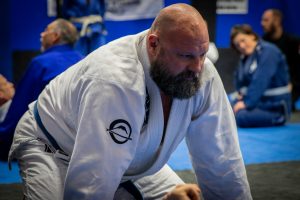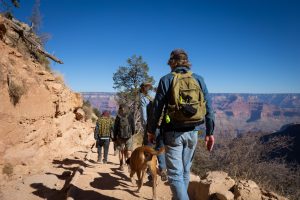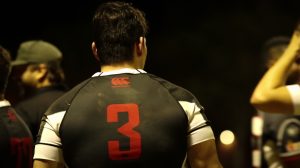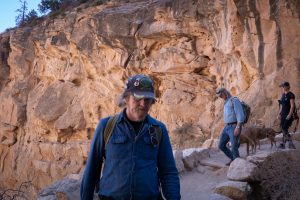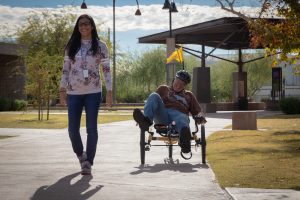- Slug: PTSD Veterans Sports, about 1,400 words.
- Photos available.
- Graphic: https://public.flourish.studio/visualisation/980305/?utm_source=showcase&utm_campaign=visualisation/980305
By Rachel Phillips, Jonathan Messiha and Sara Abbott
Cronkite News
PHOENIX – Elmer Ugarte, 33, copes with feelings of isolation by competing on the rough fields of rugby.
Shaun Barlow, 40, escapes to the woods for hunting and camping to combat his feelings of depression and isolation.
Jean-Paul Villont, 48, channels his hyper-alertness and paranoia by competing in jiu-jitsu.
What they all have in common is post-traumatic stress disorder – brought home from wartime service in the U.S. military. Sports allow them to work as a team, like in the military, and find a new family and community among like-minded veterans.
A new study scheduled to be published in the spring by the Journal of Community Engagement and Scholarship finds that participating in intense sports and other outdoor activities is an effective alternative treatment for PTSD, although it notes that more research still needs to be done. Traditional methods include medication and therapy.
Physical activity does not directly treat the brain or its chemical composition, but it helps some veterans alleviate the terrorizing symptoms of PTSD, said Tracey Burraston, author of the study who earned her master’s degree in military psychology from Adler University.
“It’s a rollercoaster and it’s 24/7. You can’t turn it off and it’s exhausting,” Burraston said. “To be in that constant state of agitation and defense is exhausting.”
In her three-year study of 32 veterans 25 to 50 years old, Burraston concluded that sports reduce anxiety in many patients with PTSD. Veterans also saw improvement in their mental stability, hyper-alertness, paranoia, depression, ability to sleep, feelings of disconnect and claustrophobia.
The Phoenix VA Health Care System already uses sports to treat veterans combating PTSD. Kayla Forster, Phoenix VA recreation therapy supervisor, said many veterans find solace participating in sports programs.
According to reports from the U.S. Department of Veterans Affairs, 11 to 20% of veterans who served in the Iraq War and 12% of Gulf War veterans deal with PTSD in any given year. It is estimated that almost a third of all veterans who served in the Vietnam War have suffered from PTSD in their lifetime.
In Phoenix, veterans say playing rugby, doing jiu-jitsu and participating in outdoor activities helps alleviate their PTSD.
Rugby and brotherhood
Once a week, Elmer Ugarte joins his Phoenix Rugby Club teammates to ferociously compete.
For Ugarte, lacing up his boots and stepping onto the field alongside his teammates offers him the greatest sense of normalcy since being shot in the heart by a sniper in Iraq.
“When you have the family aspect of it, with the brutality of it, and then just the celebration of it, it’s just a great mixture,” Ugarte said of rugby.
For seven years, the military was all Ugarte knew, leaving him with a sense of unease when he returned to his former life.
“For me, it’s never going to be that easy again. It’s never going to be black and white. They’re either trying to kill you or they’re not trying to kill you,” Ugarte said.
After being forced to leave his brotherhood of soldiers because of his physical and mental injuries, Ugarte said he was unknowingly in need of a new family.
He found it in rugby.
“I don’t want to think of where I would be without it,” Ugarte said.
The sport has given him an outlet for his aggression and the kind of camaraderie and brotherhood he had in the U.S. Marines.
“When I cross that line and go on that pitch and start playing, my problems are on the sideline, they’re not with me right there,” Ugarte said. “It’s me, the ball, my team, the other team and the contact and that’s it.”
P.J. Rovinelli Jr., 36, Phoenix Rugby Club president, said he knows the importance of the team’s comradeship.
“It may get ugly and shifty during the game but the minute the whistle blows, we’re all mates and we’re going to go back and we’re going to go celebrate together,” Rovinelli said. “We’re going to have this moment of fellowship.”
Rugby is all about serving the sport, community and your teammates, similar values that he said Ugarte would have found in the military.
“I lost something that I’ll never really have again, in the brotherhood,” Ugarte said. “You find it in little places here and there, and rugby’s definitely one of them.”
While Ugarte finds solitude hitting the rugby field, others require more soothing activities to bring comfort to their lives.
The serenity of outdoors
Stepping outside into the fresh, soothing air, Shaun Barlow absorbs the serenity around him, saying it brings peace of mind, ultimately alleviating the intense PTSD symptoms he typically struggles with.
When feeling overwhelmed, Barlow takes his form of therapy outdoors – camping, hiking and hunting.
For some veterans, Burraston said, it’s too overwhelming to even leave the house because of the emotional and physical responses to anything others would consider normal, like a door slamming or traffic. “So a lot of guys don’t leave their houses for years,” she said.
Barlow said he wanted to conquer his fear of being outside with stimuli everywhere. But most importantly, Barlow needed people around him who understood what he had been through and could help him fight through the struggles.
Joining Changed by Nature Outdoors, a Phoenix nonprofit that takes veterans, first responders and underprivileged children on outdoor adventures, “got me out of my rut,” Barlow said.
The Phoenix VA advocates for outdoor activities for veterans who cannot find solace in contact sports, or are not physically fit enough to do them. But Forster said veterans need to find something they can truly immerse themselves in.
“If they don’t find the interest and the drive and the passion to do those sports, it’s not going to benefit them,” said Forster.
Johanna Avilez, adaptive sports coordinator and recreation therapist at the Phoenix VA, said outside activities provide distraction for veterans and opportunities to focus on something other than the overwhelming symptoms.
Burraston sees the physical benefits too, explaining that outdoor activities like camping and fishing help veterans normalize their heart rates and improve their breathing patterns.
“When you’re outside and you’re breathing and moving, you get your blood going and start to feel better about life,” Burraston said.
Barlow found that his sleep and family interactions improved.
Jiu-Jitsu and its benefits
Jean-Paul Villont heads to his dojo in Mesa several times a week to practice jiu-jitsu and control his PTSD.
Veterans partner up as they duel each other, using their fighting techniques. The veterans also help each other improve their skills.
“It mimics the military unit. Not only do these guys train six days a week, but they also hang out together… so they have that core family,” said Burraston, whose research focuses on jiu-jitsu. “If anyone starts to feel bad, then the other guys will step in, be positive, uplift them and support them.”
Villont started doing jiu-jitsu three years ago, after learning of Burraston’s study. Knowing he would be training with other veterans, Villont took off his shoes and hit the mat. He did not fully anticipate the effects it would have on his life.
After serving in the Marines, Villont said he struggled to control his PTSD and could not drive home without experiencing road rage or lashing out. He could not eat, sleep well or socialize properly, as his hyper-alertness and paranoia kept his brain constantly active.
Villont noted it was impossible for him to find peace of mind.
In a matter of weeks, Villont turned his life around as jiu-jitsu became his new form of therapy, and he managed to wean himself off his medications.
“It changed my life… it’s helped me quiet all the stuff in my head and expanded my patience which bleeds out into everything else,” Villont said.
Burraston’s study showed at least a 90% reduction in veterans’ post-traumatic stress levels since they began jiu-jitsu.
Villont described his post-traumatic stress as a “boiling pot of water.”
“You pour some of that off so it doesn’t boil over, and that’s what coming to class does for me, just lowers that threshold,” he said.
Villont said his best treatment is a combination of jiu-jitsu and counseling, rather than medication.
Sports not full-proof answer
While Burraston sees sports as beneficial for PTSD, she cautions that going off medication should be handled case by case.
Without a doctor’s supervision, it could be detrimental for someone on a lot of medication to come off them 100%, said Burraston and Annette Hill, a Phoenix PTSD specialist and counselor.
“I would never suggest that a person suddenly come off their meds,” Hill said.
Forster and Avilez advocate for a team approach to helping veterans.
“Post-traumatic stress symptoms are most likely not going to go away,” Forster said. “But it’s teaching them how to learn these coping skills to deal with those triggers as they arise.”
Ugarte, Barlow and Villont all advocate for different physical activities in combating PTSD.
“It all depends on the person,” said Burraston. “Different things work for different people.”
For Ugarte, rugby was the answer.
“That happiness is just something that I wish I could hold onto and bottle up and take every day,” he said. “But I can’t, it comes and goes and that’s why I hate whenever a rugby season ends.”
For more stories from Cronkite News, visit cronkitenews.azpbs.org.
